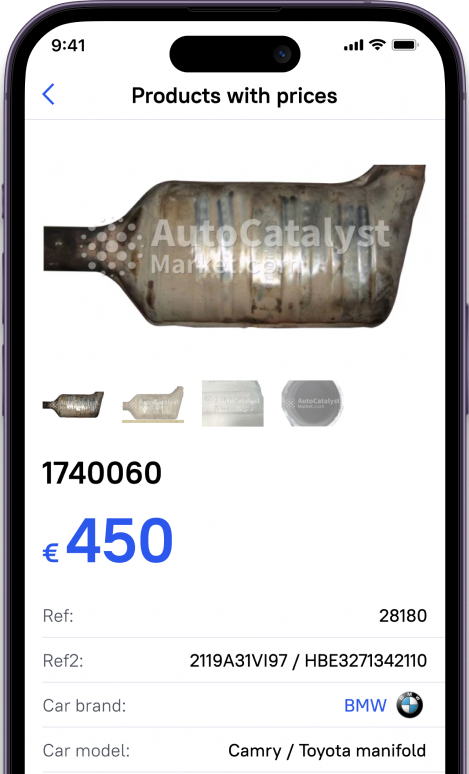- Catalyst malfunction symptoms
- - the decrease in motor performance;
- - rumble under the bottom;
- - low pressure of exhaust gases from a muffler
- - activation of Check Engine icon on a dashboard
- Causes and consequences of catalyst failure for the engine
Catalyst is part of the exhaust system and is located in the immediate vicinity of a vehicle's exhaust manifold. Catalyst enters into that incandescent exhaust manifold, and after that, significantly slowed down, cooled and cleaned of harmful substances, it appears in a resonator and in a muffler.
The principle of operation of a catalyst is based on chemical reactions that neutralize harmful emissions of nitrogen oxide, carbon, and all kinds of hydrocarbon groups. The main element of a catalyst is made in a form of a massive ceramic or metal block with small honeycombs, on walls of which precious metals are applied: an alloy of iridium and platinum, as well as rhodium and palladium. When touching chemically active surfaces, harmful compounds are burned and removed from the exhaust pipe in the form of harmless N2 and CO2. Platinum and palladium act as oxidants in a catalyst and greatly accelerate the combustion of hydrocarbons. The active element is placed in a metal casing and provided with a layer of thermal insulation.
Catalyst not only traps and neutralizes harmful compounds but also directly affects the operation of an engine. Signals from sensors located at the input and output of a catalyst are constantly read by the "brains" of a car and help to optimize working mixture in the best way. It is better to know in advance all possible reasons for a malfunction to avoid engine and vehicle damage.
Catalyst malfunction symptoms
The service life of an expensive catalyst is usually about the same as the service life of the entire car, but it often breaks down much faster than it should be and can pull the engine with it. It is important to remember that a catalyst does not fail for no reason. Its breakdown is a sign of improper operation of the ignition system, incomplete combustion of a mixture in cylinders, severe engine wear, or prolonged use of low-quality fuel.
You can understand that your catalyst is being scrapped by several characteristic symptoms:
- the decrease in motor performance;
The most common symptom of a catalyst failure is a severe decrease in engine power. The car starts to lose momentum and accelerates poorly. Engine runs unstable, overheats, and stops. This happens when the throughput of a catalyst is greatly reduced: the honeycomb is destroyed, melted and sintered, clogging the hole and interfering with the free passage of exhaust gases. At the initial stage of such catalyst malfunction, the car will accelerate to a relatively low speed, the engine starts hard, and then "suffocate" and stall. Fuel efficiency also deteriorates markedly. Also, during a cold start, a strong unpleasant odor appears.
- rumble under the bottom;
A loud rumble under the underside of a car indicates that the active element of a catalyst has begun to deteriorate and fall apart. Ceramic catalyst fragments affected by exhaust gas flow randomly beat against walls of a casing and create an unpleasant rumble. As a rule, this is most clearly manifested at increased engine speeds and during start-up.
- low pressure of exhaust gases from a muffler
If you bring your hand to an exhaust pipe, you can feel a pulsation. Exhaust valves of cylinders work alternately. If the exhaust flow is even and constant at idle, this is a sure sign of a clogged catalyst. If you increase the speed and then turn off the engine, exhaust gases will continue to build up pressure for a short time, gases accumulated in the clogged catalyst pipe come out.
- activation of Check Engine icon on a dashboard
The most common symptom of a catalyst failure is a system error that activates the engine trouble icon on a dashboard. If this symptom appears, you need to immediately read the error code with a diagnostic scanner and fix the problem. If car "brains" detects incorrect readings on oxygen sensors, they immediately notify the driver of this, and at the same time put the engine control system into emergency mode. This is often accompanied by a deterioration in dynamics and increased fuel consumption. Computer diagnostics in this case often detects errors P0420 (low catalyst throughput) or P0430.
Causes and consequences of catalyst failure for the engine
Failure of a catalyst does not occur suddenly and without reason. With the correct operation of all other systems, it faithfully serves for many years until the moment the vehicle is scrapped (and often survives it). If the catalyst breaks down on your car, melts, or crumbles, you will almost certainly have to diagnose and repair the ignition or power system.
As a rule, the catalyst is damaged precisely due to the incorrect operation of these two systems. With a faulty ignition system, fuel in one or more cylinders does not burn out completely but enters the exhaust system. The second catalyst is forced to burn off increased volumes of hydrocarbons, which heat the honeycomb to ultra-high temperatures, which leads to their sintering. Spark plugs, coils, or high-voltage wires can cause major trouble. A malfunction of injectors, which begin to pour fuel, leads to similar breakdowns. Worn or stuck oil scraper rings of cylinder-piston group or failure of oil scraper seals lead to the same result, only engine oil burns out in a catalyst.
Another common cause of catalyst failure is severe mechanical damage leading to the deformation of the housing. It is important to remember that thin-walled combs can easily crumble even with minor physical exertion. Leaving off-road, it will be useful to attend to the installation of additional protection for underbody as well as your car catalyst.
Failure to repair the catalyst is dangerous because small particles of ceramics can get through the exhaust tract straight into the engine cylinders. Once there, they instantly scratch the cylinder walls and completely disable the engine. Suffering from ceramic debris and turbine (if any). Additional heating of the exhaust tract leads to deformations of the cylinder head and greatly reduces the resource of a power unit.
To avoid critical breakdown, do not bring your car to a deplorable state and fix the catalyst malfunction in time. Fortunately, it is quite possible to do this even on your own.









































